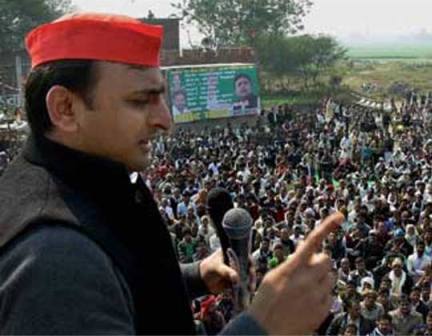New Delhi : Three young leaders put their heart and soul in the campaign in Uttar Pradesh, but it was Akhilesh Yadav who walked away with the honours. Yadav’s efforts helped the Samajwadi Party emerge triumphant, negating the efforts of Congress general secretary Rahul Gandhi and Rashtriya Lok Dal (RLD) leader Jayant Chaudhary.
The three young leaders have a lot in common. They are inheritors of political legacies and are MPs from Uttar Pradesh. But while Gandhi and Chaudhary fought as allies, Akhilesh’s party contested the 403 seats on its own.
Party leaders said Akhilesh reshaped SP’s thinking by going beyond caste mobilisation and sought to connect its campaign to the aspirations of the youth in the country’s most populous state, which lags behind in human development parameters.
They said Akhilesh prevailed upon the leadership to shed its image as a party opposed to computers and English language. The party has promised laptops to students who clear Class 12 from government schools.
Son of SP supremo Mulayam Singh Yadav, Akhilesh attempted to wash off the taint of his party’s association with criminal elements during its rule in the state. He vetoed induction of don-politician D.P. Yadav.
As trends showed the party was coming up trumps, Akhilesh said he was not in the race for chief minister’s post.
“The party feels that the responsibility should go to Netaji,” he said, referring to party leader and former chief minister Mulayam Singh Yadav.
The SP had advantage over the Congress as it was the main opposition in the state, having secured around 25 percent votes in the 2007 polls. It also had a clear chief ministerial candidate in Mulayam Singh Yadav. The party appears poised to get full majority in the 403-member Uttar Pradesh assembly.
Though Gandhi, 41, sought to neutralise the weaknesses of his party with a high-pitched campaign, the results for the party were far below its expectations.
Gandhi, MP from Amethi, addressed over 200 rallies in the campaign and traversed nearly 3,500 km during his five Jan Sampark Yatras (public contact programmes) that started last November. He held road shows in cities and covered about 10,700 km between Jan 28 and Feb 29.
Gandhi whose father, grandmother and great grandfather were prime ministers of the country, told the voters that his mission was not restricted to elections but was about changing Uttar Pradesh and bringing the party back to power, where it last ruled 22 years ago.
The Congress had a paltry vote share of about eight percent in 2007 polls and had won just 22 seats in the assembly.
The party has lost all the seats in Rae Bareli, the Lok Sabha constituency of party chief and Rahul’s mother Sonia Gandhi, while in Rahul’s own Amethi Lok Sabha constituency, the Congress is trailing in two seats.
The Congress is poised to finish fourth in the assembly polls, with a marginal improvement in its previous tally.
After the verdict, Rahul said he accepts responsibility for the party’s poor showing. “The Congress’ fundamentals were weak and organisationally we were not where we should be and the general mood was for the Samajwadi Party.”
Unlike Gandhi and Akhilesh Yadav, Jayant Chaudhary, 33, contested the assembly polls as a party nominee.
Chaudhary, whose father is a union minister and grandfather Charan Singh was a former prime minister, raised issues of land acquisition, corruption and injustice to farmers during his campaign.
The RLD is not poised to make any significant gains from its tally of 10 in 2007 polls.
IANS
The opinions, beliefs and viewpoints expressed by authors, news service providers on this page do not necessarily reflect the opinions, beliefs and viewpoints of Hill Post. Any views or opinions are not intended to malign any religion, ethnic group, club, organization, company, or individual.
Hill Post makes no representations as to the accuracy or completeness of any information on this site page.




